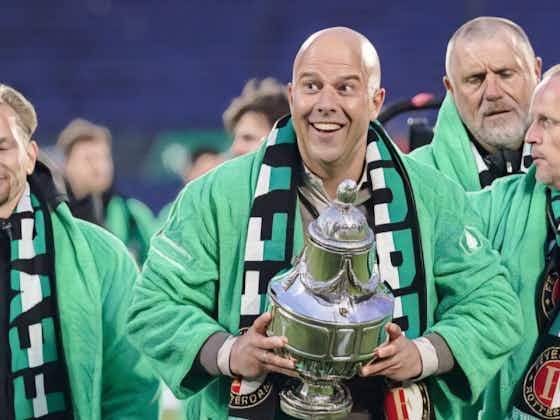The Football Faithful
·21 de maio de 2024
The chequered history of Dutch managers in the Premier League as Slot takes Liverpool job

In partnership with
Yahoo sportsThe Football Faithful
·21 de maio de 2024

Arne Slot became the tenth ever Dutchman to take charge of a Premier League team after Liverpool officially announced him as their new manager.
The 45-year-old has an unenviable task ahead of him in replacing Jurgen Klopp, who became a club legend after guiding the Merseyside outfit to a sixth Champions League and a first league title in 30 years.
Slot arrives at Anfield on the back of success at Feyenoord, having guided the Rotterdam club to a Europa Conference League final, the Eredivisie title and a KNVB Cup over the past three years.
He’s not the first Dutch manager to arrive in England with a track record of achievement though, and many of them have failed to make an impact.
Slot will be hoping to avoid the fate of his compatriots as he takes on one of the biggest jobs in world football.
Ruud Gullit became the first coach from the Netherlands to manage a Premier League club when he was installed as player-manager at Chelsea in 1996. He enjoyed initial success in England, becoming the first black manager to win a major English trophy by guiding the Blues to FA Cup glory in 1997, followed by a second-placed finish the next year.
Club chairman Ken Bates controversially sacked the “arrogant” Gullit, who upped sticks to Newcastle United. His stint at St James’ Park was nothing short of a disaster as he fell out with fan favourites Alan Shearer and Rob Lee. He dropped the England striker for a home defeat to Sunderland, which prompted his resignation.
It would be another five years until we saw a Dutchman back in a Premier League dugout, with Spurs taking the plunge on Martin Jol in November 2004. He brought the club to the brink of Champions League football, but fell out of the top four on the final day of the season in the infamous ‘lasagne-gate’ defeat to West Ham, for which several first-team players fell ill.
Sacked following a poor start to the 2007-08 season, Jol returned to England four years later with Fulham, leading them to a top-half finish. He was sacked by new owner Shahid Khan in 2013 and replaced by compatriot Rene Meulensteen, who only lasted 13 games as the Cottagers tumbled towards relegation.
Staying in south west London, Guus Hiddink twice took interim charge of Chelsea to help Roman Abramovich steady the ship. His first spell saw him win the FA Cup, while he also guided the team a third-placed finish and the Champions League semi-final, where they were controversially eliminated by Barcelona, in 2009.
The former Real Madrid boss returned six years later in the wake of the team’s implosion under Jose Mourinho. He boasts the best win rate of any Dutch manager of a Premier League club, coming out victorious 53 percent of the time, and lost just four of 34 matches across two spells.
One of the most memorable managerial appointments in recent memory has to be Louis van Gaal at Manchester United in 2014. He was heavily linked with the Spurs job, but the Red Devils swooped in for him after he led the Netherlands to third place at the Fifa World Cup.
Although the Dutchman never truly won over the fans with his slow, methodical football, he was a thoroughly entertaining and eminently quotable figure during his time in England. We were treated to comments about asses twitching on the bench, footballers being ‘horny’ to play, and hair-pulling being an acceptable part of sado-masochism but not football.
Van Gaal secured a top four spot in his first season and the FA Cup in his second, but he was replaced by Jose Mourinho shortly thereafter. We will never see his likes again, sadly.
Ronald Koeman also arrived on the scene in 2014, joining a Southampton team that lost many of its first-team players in the summer, prompting one of the best tweets from a Premier League manager.
The Barcelona legend enjoyed a flying start at St Mary’s Stadium nonetheless, leading them to second in the league early in his reign. Ultimately they finished seventh in first campaign, followed by sixth the following year.
Koeman subsequently jumped ship to Everton, who he led to the Europa League, but a poor start to his second season saw him get the boot.
We are really getting to the thin end of the wedge now. Dick Advocaat did an impressive job to save Sunderland from the drop in 2015, earning a point against rivals Newcastle, beating Everton and Chelsea in successive matches, and drawing with Arsenal.
The Black Cats convinced him out of pre-planned retirement to stay on at the Stadium of Light, but he was sacked following a poor run of results. In the end he won just three of his 17 matches in charge.
Advocaat can at least say he is not the worst Dutch manager to have graced the English top flight. That honour belongs to Frank de Boer, who spent just 77 days in charge of Crystal Palace – the third-shortest reign in Premier League history.
The Dutchman replaced Sam Allardyce, arriving with the goal of transforming the team’s in a possession-based side. It was doomed from the get-go and it took just four games for him to be sacked.
Palace lost all four; no other permanent manager has taken charge of so few games or been less successful. Although they did win a League Cup tie against Ipswich Town.






























































